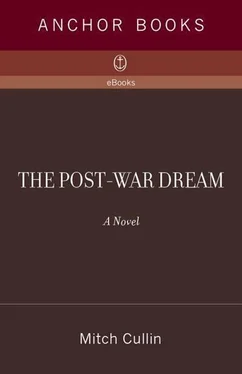“Tough fucking luck. Too bad for you.”
No, no, Hollis thought, don't think about it anymore. Leave it be.
But even after disposing of the toy soldiers — dropping them into a mass grave and covering them with soil, sealing them beneath a small piece of flagstone — he was unable to shake what he had tried for so long to forget. How strange, he considered, that a single day — or an hour, or a minute, or a second — could drastically change the direction and outcome of someone ‘s entire life. One man's sudden misfortune, he knew well enough, might be another man's salvation. He turned his eyes from that piece of flagstone, and surveyed the barren ground on which he stood. Just then, the garden became transformed in his mind, ceasing to be a place of pleasant diversion but, rather, now an expansive grave plot for memories which refused to stay buried.
In all — once the days of 1950 were tallied up and relegated to an increasingly remote past — Hollis had spent less than a month fighting the North Koreans, from the last week of July to early August, with the majority of 7th Cavalry deaths he witnessed occurring while en route to the Naktong River (the 2nd Battalion retreating southward as advancing enemy tanks, snipers, and artillery shells chased them in rain and sun to the base of the Sobaek Mountains). How indescribable his time abroad sometimes felt — how abrupt and hallucinatory — like a blur which had swept through a brief portion of his life, taking him from rural America to urban Japan to the hills and valleys of South Korea, and bringing him back home to Minnesota from what, upon reflection, could have been described as a whirlwind vacation to hell. Yet it was early on — just before Schubert's killing, before McCreedy stopped smiling and began gritting his teeth, while everyone still believed the conflict was to be a short-lived affair — that he experienced his own grim turning point, a moment when, as it would soon happen for McCreedy, the war took on the attributes of a debased and needless game; except, unlike McCreedy, Hollis recoiled from the horrors he glimpsed (averting his stare if possible, hesitating at times to pull the trigger of his M1), attempting to keep himself somehow separate while also perceiving many of his fellow cavalrymen as nothing more than willful children set loose on a massive playground, becoming promiscuous with their weapons and the disposal of human life. Nevertheless, he knew his autobiography would skirt these amoral, vexing aspects of the war, and in some manner, if he got around to actually writing it, he would need to revise certain facts, censoring moments of his own history by deliberate omission, shifting much of the story into a fictional parallel universe just so he could sleep at night.
The maddening reality, however, refused to transform itself in his memory, regardless of how he intended to modify events with the aid of words and a computer. For it was only five days after setting foot on Korean land, during their first full operation at the front, that the 2nd Battalion of the 7th Cavalry regiment found itself positioned in the hills above a curving railroad line — the bare tracks beneath them cutting over a small double-arched concrete trestle near the village of No Gun Ri. On that Wednesday, the sun blazed high, enhancing the humidity, reflecting off of rifles and binocular lenses. Cicadas purred within acacia trees. Long-necked herons were spotted at times, flapping across a sky which was dotted with clouds. Down below — close to the trestle, gathered under acacia trees and in the shade beside the railroad embankment — were exhausted, frightened refugees: six hundred or so weary souls (elderly, middle-aged, young, entire families who had been evacuated from the Chu Gok Ri valley), wearing billowing white clothing and walking on rice-straw sandals, hauling livestock while making their way to the village of Hwanggan, but resting now among the cool shadows before proceeding with heavy packs or children on their backs — aware all the while of the Americans scattered around the hills, yet feeling secure in the relative stillness of a bright midday.
Hollis has always had difficulty placing himself there in a hillside foxhole, or accurately remembering what actions he took as the events of July 26 unfolded. In some regard, his recollection was not unlike the perspective of the herons which swooped above everything — the rice paddies, the distant pine groves, the valley, the railroad tracks, the refugees, the Americans — gliding for the jagged slopes of White Horse Mountain. Yet he knows other soldiers blew whistles at the moment three air force planes emerged through the clouds, roaring from the horizon, and sailed low toward the refugees. And he knows, as the refugees paused and gazed upward at the planes, the valley below him suddenly exploded in a deafening thunder — again and again and again, shaking the ground with greater anger than any earthquake he would experience in Southern California — throwing stones and trees and bags and bodies into the sky, blasting limbs apart, tearing clothing away and turning the day to night amid a storm of dust and dirt. Cattle bellowed in chorus with human screams. The wounded briefly moaned for help or gasped last breaths. Then more bombs and rockets fell, machine guns rattled from the planes, as survivors ran in every direction, stunned and panicked — some dragging children, some pressing hands on their ears, some incapable of moving — while pieces of people and livestock crashed hot to the ground.
When the planes retreated, careening beyond the clouds, they left in their wake an appalling aftermath. The tracks running parallel to the embankment had become a twisted, fractured mess of steel, and craters fumed where just previously villagers had rested on rice-straw mats. Shrouded by the heavy smoke which obscured the destruction, the wounded lay dying, either motionless or writhing near burning baggage and smoldering carnage (bits of fingers, severed heads, naked torsos, a dead man's legs pointing straight up at the heavens). Weaving through the mortally injured and the remnants of bodies, its entire brown hide set ablaze, a solitary cow managed to reach the perimeter of that hellish scene — the black smoke unfurling there ahead of it, faintly revealing faraway mountains and blue sky — and heaving a prolonged cry of misery, its legs buckled and it collapsed into a silent, fiery heap.
The refugees fortunate enough to escape the attack had fled for the hillsides, while others found shelter inside the narrow, 200-foot-long passageway of a culvert underneath the railroad, or beneath the twin tunnels of the trestle. But many of those clambering along the hills, striving to find safety, soon ran out of options; when word came through the line to open fire on them, it was McCreedy who, without any hesitation, immediately discharged his M1 after catching a small girl in his sights and, upon striking the child, exclaimed, “Got her!” And though Hollis tells himself no one was murdered by his weapon, at least not on that day, he is fully aware of having aimed his rifle — perhaps at rocks, maybe at those who were already killed — and pulling the trigger. Then what's lodged in his mind isn't so much his participation in the action, but, rather, freeze-frames of memory capturing the untested teenage cavalrymen who stood or knelt closest to him; only days previously they had entered dank Tokyo bars, fondling taxi dancers and requesting sake or beer, yet, with the passing of a week, they were gripping their weapons in Korea and shooting, for the first time in their lives, complete strangers. How quickly they had all adapted — launching mortar shells at defenseless groups of refugees, spraying machine-gun rounds into the culvert and the trestle tunnels, killing villagers even as they understood they were there to fight for them, firing simply because they were ordered to do so.
Читать дальше










![Theresa Cheung - The Dream Dictionary from A to Z [Revised edition] - The Ultimate A–Z to Interpret the Secrets of Your Dreams](/books/692092/theresa-cheung-the-dream-dictionary-from-a-to-z-r-thumb.webp)

